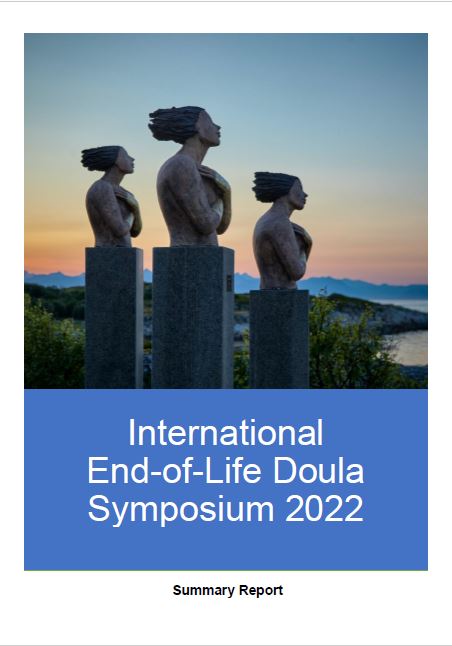This blog provides a brief overview of the International End-of-Life Doula Symposium and a link to the Symposium’s summary report. This virtual symposium was held over three days on April 25-27th 2022 and was a co-produced effort between academic researchers, End-of-Life Doulas, and graduate students in our End of Life Studies programme [1]. It was the first international symposium or conference of its kind [2].
Over the last few years interest in End-of-Life Doulas has been growing. However, even if you have heard about them, you may still not know much about them. ‘End-of-Life Doula’ (EOLD) is a commonly used umbrella term to identify lay people, primarily women, who provide a diversity of nonmedical supports—social, emotional, practical, and sometimes spiritual—for people nearing the end of life, and their family and friends [3]. More specifically, EOLDs provide informed companionship and resources before, and during, the dying process. In some regions, this may include after-death care of the body and funeral planning education or services. Practitioners may also host community education and social events, such as advance care planning workshops and Death Cafés.
I’m interested in End-of-Life Doulas because they potentially represent an important new response to changing desires and concerns about the end of life in Western societies. Another reason for my interest is that many EOLDs are attempting to bridge a ‘reclaiming’ of community traditions of caring for the dying and dead while also seeking to develop into a new quasi-professional role. At the same time, this role is still developing and in flux. As they develop, an as yet unanswered question is whether or not they will be able to meet their promised potential to radically improve end-of-life care through empowering individuals and by framing death, dying, and bereavement as social justice issues. Can EOLDs also help communities develop the skills to be ‘compassionate’, and reduce the burden on health care systems?
I am curious to explore these, and other questions, through collaborative research that can help EOLDs to critically examine the historical development, present practices, and possible futures of this grassroots movement. However, there have been few opportunities for practitioners to collectively discuss their work and interests within an international context. Therefore, in late April 2022, I organized a collaborative international symposium that brought together diverse community-based end-of-life care practitioners and key stakeholders. You can find out more about our collaborative team here.
The 2022 International End-of-Life Doula Symposium was a facilitated virtual space for discussing the development of the field within an international context. The symposium offered a range of opportunities for both structured and unstructured conversations, with nearly 40 participants from seven different countries gathering over three days to discuss key practices and debates in the field.
We’re very pleased to be releasing a summary report of the symposium discussions, which can be downloaded here. We’ve organized the report into four themes. The first theme focuses on the developmental roots of EOLDs and what we can learn from the emergence of the contemporary EOLD role. The second theme considers EOLDs as cultural ‘change agents’ and as disruptive innovators in end-of-life care. The third theme explores the many challenges facing current practitioners as the field expands. The fourth theme reflects on the possible future directions and issues for EOLDs, both as individuals and collectively.
A key goal of this first-of-its-kind event was to develop collaborative relationships with EOLD practitioners and organizations across different countries. In the words of one symposium participant:
“As I reflect on the End of Life Doula International Symposium, I think of the need to work in collaboration with other countries and create relationships across the waters. By learning and working together internationally, we create a stronger presence and community of practice which will add to the research and the uptake of end-of-life doulas”.
Due to the symposium’s success, we are now developing a second annual event for 2023, as well as building an international research working group. Our overall goal is to create a collaborative network that enables EOLDs to influence policy and be agents of change at the international level in ways that promote a diversity of voices and perspectives.
*******************
[1] Several of the symposium collaborators and volunteers crossed these boundaries, being academic researchers and practicing EOLD, and/or students in the End of Life Studies MSc programme.
[2] The End-of-Life Doula Symposium was funded by an Impact Acceleration Account, through the UKRI and the ESRC
[3] The term ‘doula’ derives from the Greek word meaning female slave or servant who cared for women and their children, and it was popularized by the natural birth movement in the US in the 1970s to describe lay-trained women providing emotional support and education during and after pregnancy, and as a compliment to midwives. However, not everybody uses this term; other common descriptors include death doulas and death midwives.


